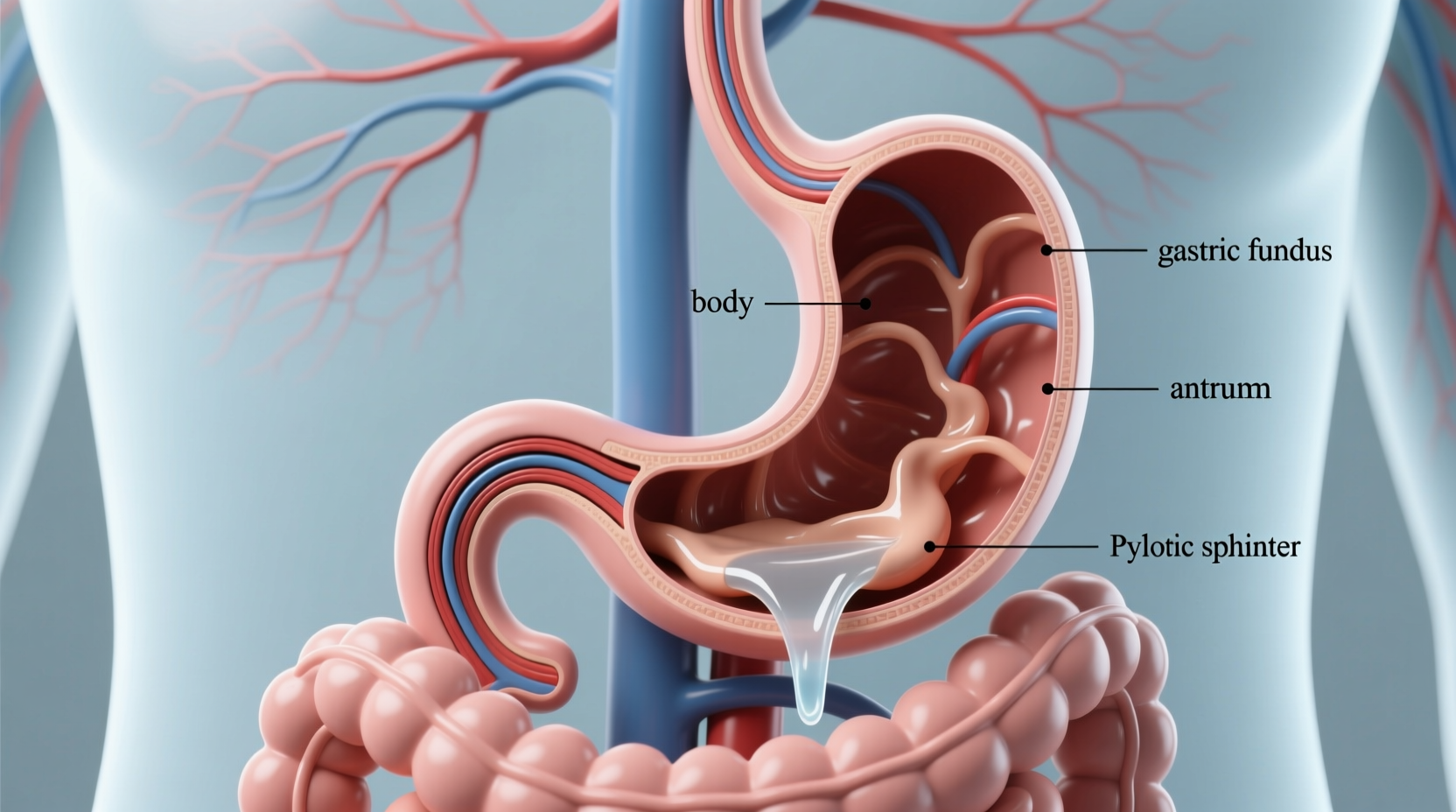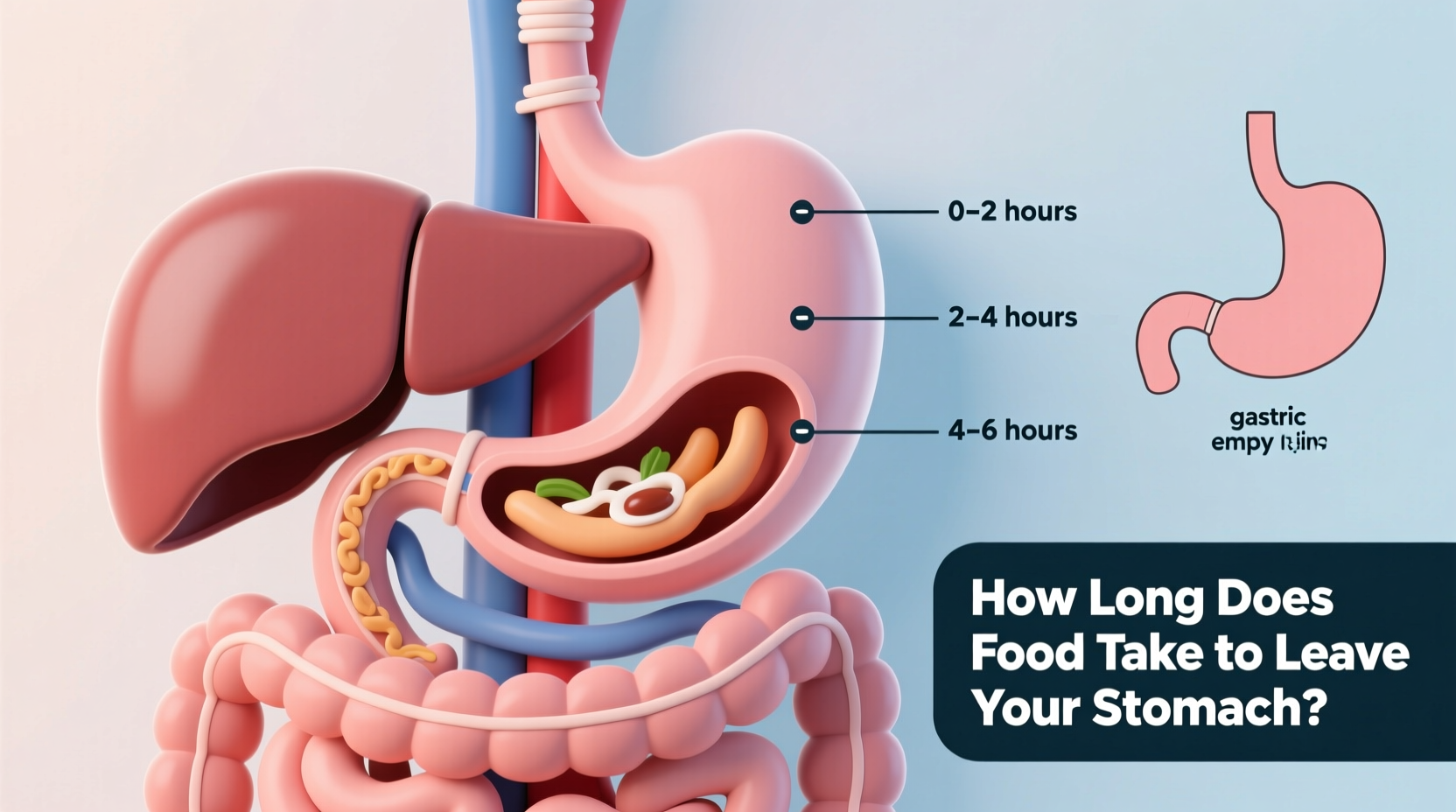Most foods take 2-5 hours to leave your stomach under normal conditions. Liquids typically empty within 20-30 minutes, while solid foods vary based on composition: carbohydrates (2-3 hours), proteins (3-4 hours), and fats (4-5+ hours). Individual factors like metabolism, meal size, and health conditions can significantly affect these timelines.
Ever wonder why you feel full for hours after a big meal or why certain foods seem to digest faster than others? Understanding how long food stays in your stomach isn't just academic curiosity—it directly impacts when you should exercise, take medications, or plan your next meal. This science-backed guide reveals exactly what happens during gastric emptying and how you can work with your body's natural rhythms for better digestion and energy management.
The Digestive Journey: What Happens in Your Stomach
Your stomach isn't just a storage container—it's a sophisticated processing center that prepares food for nutrient absorption. When you swallow, food enters the stomach where it mixes with gastric juices in a process called mechanical digestion. The stomach's muscular walls churn food into a semi-liquid mixture called chyme, which gradually passes into the small intestine.
Gastric emptying follows a predictable pattern, but the timeline varies significantly based on what you've eaten. This isn't just "how long until I'm hungry again"—it affects blood sugar regulation, nutrient absorption, and even your energy levels throughout the day.
Food Composition: Your Digestion Timeline Blueprint
The macronutrient composition of your meal is the single biggest factor determining how long food remains in your stomach. Here's what research shows about different food types:
| Food Type | Typical Gastric Emptying Time | Key Influencing Factors |
|---|---|---|
| Water and clear liquids | 20-30 minutes | Temperature, electrolyte content |
| Carbohydrate-rich foods (fruit, bread) | 2-3 hours | Fiber content, sugar composition |
| Protein-rich foods (meat, eggs) | 3-4 hours | Protein type, cooking method |
| Fat-rich foods (avocado, nuts) | 4-5+ hours | Fat composition, meal combination |
| Mixed meals (balanced plate) | 3-5 hours | Macronutrient ratio, portion size |
This data aligns with research published in the American Journal of Physiology, which demonstrates how different macronutrients trigger hormonal responses that regulate gastric emptying speed. Fats trigger the release of cholecystokinin (CCK), which significantly slows stomach emptying—explaining why high-fat meals keep you feeling full longer.
Your Personal Digestion Timeline: Beyond Food Type
While food composition matters, your individual physiology creates unique digestion patterns. Consider these factors that affect how long it takes for food to leave your stomach:
Meal Size and Composition
Larger meals take longer to process. A 500-calorie meal might empty in 3 hours, while a 1,000-calorie meal could take 5+ hours. The combination of macronutrients also matters—adding protein to carbohydrates slows gastric emptying compared to carbs alone.
Hydration Status
Proper hydration supports optimal digestion. Dehydration can slow gastric motility, while drinking water with meals slightly accelerates liquid emptying (though excessive fluids may dilute stomach acid).
Age and Metabolism
Gastric emptying slows with age. Young adults typically process meals 20-30% faster than older adults. Metabolic rate also plays a role—those with higher metabolic rates often experience slightly faster digestion.
Physical Activity Level
Moderate movement after eating (like a 15-minute walk) can accelerate gastric emptying by 15-20%, according to research from Mayo Clinic. However, intense exercise immediately after eating can actually slow digestion.

When Digestion Takes Too Long: Recognizing Concerns
While 2-5 hours represents normal gastric emptying, certain symptoms indicate potential issues:
- Persistent bloating lasting more than 5 hours after eating
- Nausea or vomiting several hours after meals
- Unexplained fullness after small portions
- Fluctuating blood sugar despite consistent eating patterns
These could indicate gastroparesis (delayed gastric emptying), which affects approximately 4% of the population according to National Institute of Diabetes and Digestive and Kidney Diseases. Diabetes, certain medications, and neurological conditions are common causes.
Practical Applications: Working With Your Digestion Timeline
Understanding how long food stays in your stomach helps you make smarter daily choices:
Optimizing Meal Timing
Allow 3-4 hours between substantial meals for optimal digestion. If exercising, wait 2-3 hours after a mixed meal or 1-2 hours after a light snack. This prevents discomfort and maximizes performance.
Medication Timing
Many medications specify "take on empty stomach" or "with food" instructions based on gastric emptying science. Antibiotics often work best on an empty stomach (1 hour before or 2 hours after meals), while NSAIDs should be taken with food to protect your stomach lining.
Digestion-Boosting Strategies
Enhance your natural gastric emptying with these evidence-based approaches:
- Include bitter greens (arugula, dandelion) in meals to stimulate digestive enzymes
- Chew thoroughly—each bite 20-30 times—to reduce stomach workload
- Consume protein at the beginning of meals to optimize hormonal signaling
- Avoid drinking large amounts of liquid during meals to maintain stomach acid concentration
Common Misconceptions About Stomach Emptying
Let's clarify some widespread myths about how long food takes to leave your stomach:
- Myth: Food rots in your stomach if it stays too long
Fact: Your stomach's acidic environment prevents bacterial growth that causes rotting - Myth: Drinking water during meals dilutes stomach acid and impairs digestion
Fact: Moderate fluid intake has minimal impact on gastric pH and may actually aid digestion - Myth: All liquids empty at the same rate
Fact: Sugar concentration matters—sports drinks empty slower than water due to osmotic effects
When to Consult a Professional
While occasional digestive variations are normal, consult a healthcare provider if you experience:
- Consistent discomfort lasting more than 5 hours after meals
- Unintentional weight loss with normal eating patterns
- Vomiting undigested food 6+ hours after eating
- Symptoms that interfere with daily activities
A simple gastric emptying study can measure your specific digestion timeline and identify any underlying issues. Most cases of delayed gastric emptying respond well to dietary modifications and, when necessary, medication.
Key Takeaways for Optimal Digestion
Your stomach's emptying timeline directly impacts your energy, nutrient absorption, and overall well-being. By understanding how long food stays in your stomach and the factors that influence this process, you can make informed choices about meal timing, composition, and daily routines. Remember that individual variation is normal—pay attention to your body's signals rather than rigid timelines. When in doubt about persistent digestive concerns, consult a healthcare professional for personalized assessment.











 浙公网安备
33010002000092号
浙公网安备
33010002000092号 浙B2-20120091-4
浙B2-20120091-4